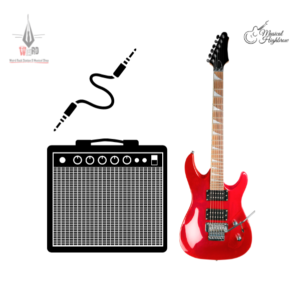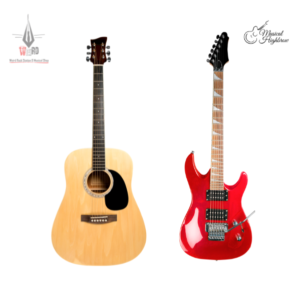Choosing between learning the acoustic or electric guitar is a significant decision for any aspiring guitarist. Each type of guitar has its own unique characteristics, advantages, and challenges. It is always possible to switch from an acoustic guitarist to an electric guitarist or vice versa. In the subcontinent, there is a myth that one should learn the acoustic guitar first and then move to the electric guitar or bass guitar, which is totally a false concept. You can start learning any instrument from the beginning and become a professional. The following guideline will help you make your decision:
Sound and Style
Acoustic Guitar:
- Sound: The acoustic guitar produces sound naturally through its hollow body, giving it a warm, resonant tone. The acoustic guitar is well-suited for musical genres like folk, country, classical, and soft rock.
- Style: If you do not have a band and want to build your musical career alone as a singer-songwriter and unplugged guitar player, you should choose the acoustic guitar. It is excellent for strumming chords and fingerpicking.
Electric Guitar:
- Sound: The electric guitar needs an amplifier to produce sound. An electric guitar is versatile in sound. You can play a clean string sound to a heavily distorted sound by using a sound processor. The electric guitar is suitable for genres like rock, metal, blues, jazz, and punk.
- Style: If you want to play guitar solos or heavily distorted power chords using various sound effects, you should choose the electric guitar. This kind of guitar is versatile in a wide range of styles.
Playability and Learning Curve
Acoustic Guitar:
- Playability: The strings of an acoustic guitar are thicker, and the distances of the strings on the fretboard are higher than the electric guitar, which can be adaptable for beginners but difficult for those who switch from electric to acoustic guitar. However, practicing with an acoustic guitar will strengthen your fingers.

- Learning Curve: The initial learning phase might be tougher due to the need for stronger fingers. However, the simplicity of not requiring additional equipment (like an amplifier) can make the learning process more straightforward in some ways.
Electric Guitar:
- Playability: The strings of an electric guitar are thinner, and the distances of the strings on the fretboard are lower than the acoustic guitar. This can be more forgiving for beginners and can reduce finger strain.
- Learning Curve: While easier to play physically, electric guitars often involve learning to use an amplifier and various effects, adding a layer of complexity. This can be both a challenge and a fun exploration of sound.
Practical Considerations
Acoustic Guitar:
- Portability: Acoustic guitars are self-contained, requiring no external equipment.
 This makes them highly portable and convenient for practice anywhere.
This makes them highly portable and convenient for practice anywhere. - Maintenance: They generally require less maintenance since there are no electronics to worry about. Regular string changes and occasional fretboard adjustments are usually all that’s needed.
Electric Guitar:
- Portability: Electric guitars need an amplifier and cables, which can be troublesome to transport. However, small practice amps and portable options are available.
- Maintenance: Electric guitars require more maintenance due to their electronic components. This includes changing strings, setting up the electronics, and occasionally dealing with issues like buzzing or grounding problems.
Costs
Acoustic Guitar:
- Initial Cost: Acoustic guitars are not as expensive compared to electric guitars. However, you need to buy a good quality acoustic guitar from the beginning to get better service and lower maintenance costs. Cheap acoustic guitars will give you trouble during practice and will cost you for maintenance on a regular basis.
- Ongoing Costs: The costs of good quality acoustic guitars are generally limited to strings, picks, and possibly a case. But low-quality acoustic guitars will cost you for their maintenance regularly.
Electric Guitar:
- Initial Cost: The cost of an electric guitar is higher than a good quality acoustic guitar. Moreover, you need to buy at least an amplifier and cables at the beginner level. Gradually, as you advance in your lessons, you will need to buy a pedal sound processor, which is also expensive.
- Ongoing Costs: In addition to strings and picks, you might need to invest in new effects, cables, and maintenance of electronic components.
Personal Goals and Preferences
Musical Aspirations:
- You need to decide what type or genres of music you want to play or like. If you dream of playing in a band, you should learn the electric guitar. If you dream of performing solo, the acoustic guitar should be your partner.
Learning Environment:
- Before learning, you should consider the environment in which you will learn and practice. If you want to learn and practice in a quiet environment, an electric guitar with headphones would be a good choice. On the other hand, if your neighbors are okay with sound and you want to learn and practice wherever you want, learning the acoustic guitar is your solution.
Social and Practical Use
Acoustic Guitar:
- Social Settings: Acoustic guitars are great for camping, picnics, social gatherings, and outdoor parties. Their portability and self-contained nature make them ideal for social music-making.
Electric Guitar:
- Band Settings: Electric guitars are essential for band music that relies on sound effects and heavy music.
Inspiration and Role Models
Influence of Musicians:
- If you are inspired and motivated by an electric guitarist, learning the electric guitar will be more effective for you. Conversely, if acoustic guitarists inspire and motivate you, learning the acoustic guitar might keep you more engaged.
Summary and Recommendations
Ultimately, the decision should align with your personal interests, goals, and the type of music you are passionate about.
Choose an Acoustic Guitar If:
- You enjoy genres like folk, country, or classical.
- You want a portable instrument.
- You prefer a simpler setup without needing additional equipment.
- You are drawn to fingerpicking and unplugged styles.
Choose an Electric Guitar If:
- You are excited about rock, metal, blues, or jazz.
- You want to explore a wide range of sounds and effects.
- You plan to play in a band or with amplified instruments.
- You find the physical playability easier to start with.
Both types of guitars offer unique experiences and opportunities for musical expression. If possible, try both types before making a decision. Your choice will shape your musical journey, so it’s important to choose the one that resonates most with your personal aspirations and musical tastes.

